Ethics in Accounting: Analysis of Venus Ltd. Case Study
VerifiedAdded on 2023/01/23
|12
|2874
|28
Report
AI Summary
This report, titled "Ethics in Accounting and History of Accounting," analyzes ethical issues within accounting, focusing on a case study involving Venus Ltd. The report identifies ethical dilemmas faced by the accountant, John Snow, and proposes appropriate courses of action based on accounting standards and ethical theories like utilitarianism and deontology. It explores the importance of integrity, objectivity, and due care in accounting practice. The report also examines the evolution of accounting regulations since the 18th century, arguing that this history supports a socially constructed perspective of accounting. It concludes with recommendations for ethical decision-making and highlights the significance of ethical principles in the accounting profession. The report emphasizes the importance of adhering to ethical standards, ensuring accurate financial reporting, and considering the impact of decisions on stakeholders.
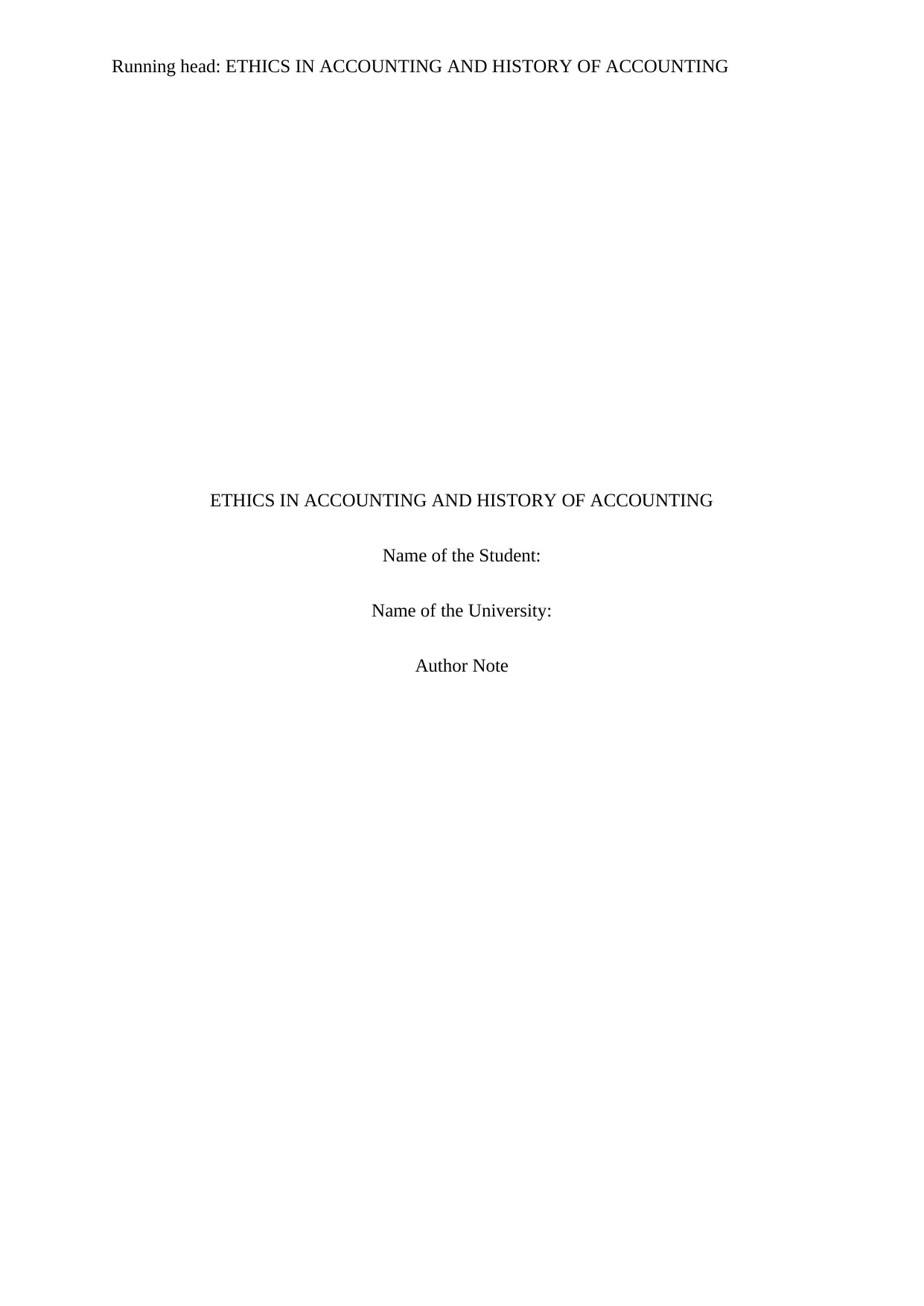
Running head: ETHICS IN ACCOUNTING AND HISTORY OF ACCOUNTING
ETHICS IN ACCOUNTING AND HISTORY OF ACCOUNTING
Name of the Student:
Name of the University:
Author Note
ETHICS IN ACCOUNTING AND HISTORY OF ACCOUNTING
Name of the Student:
Name of the University:
Author Note
Paraphrase This Document
Need a fresh take? Get an instant paraphrase of this document with our AI Paraphraser
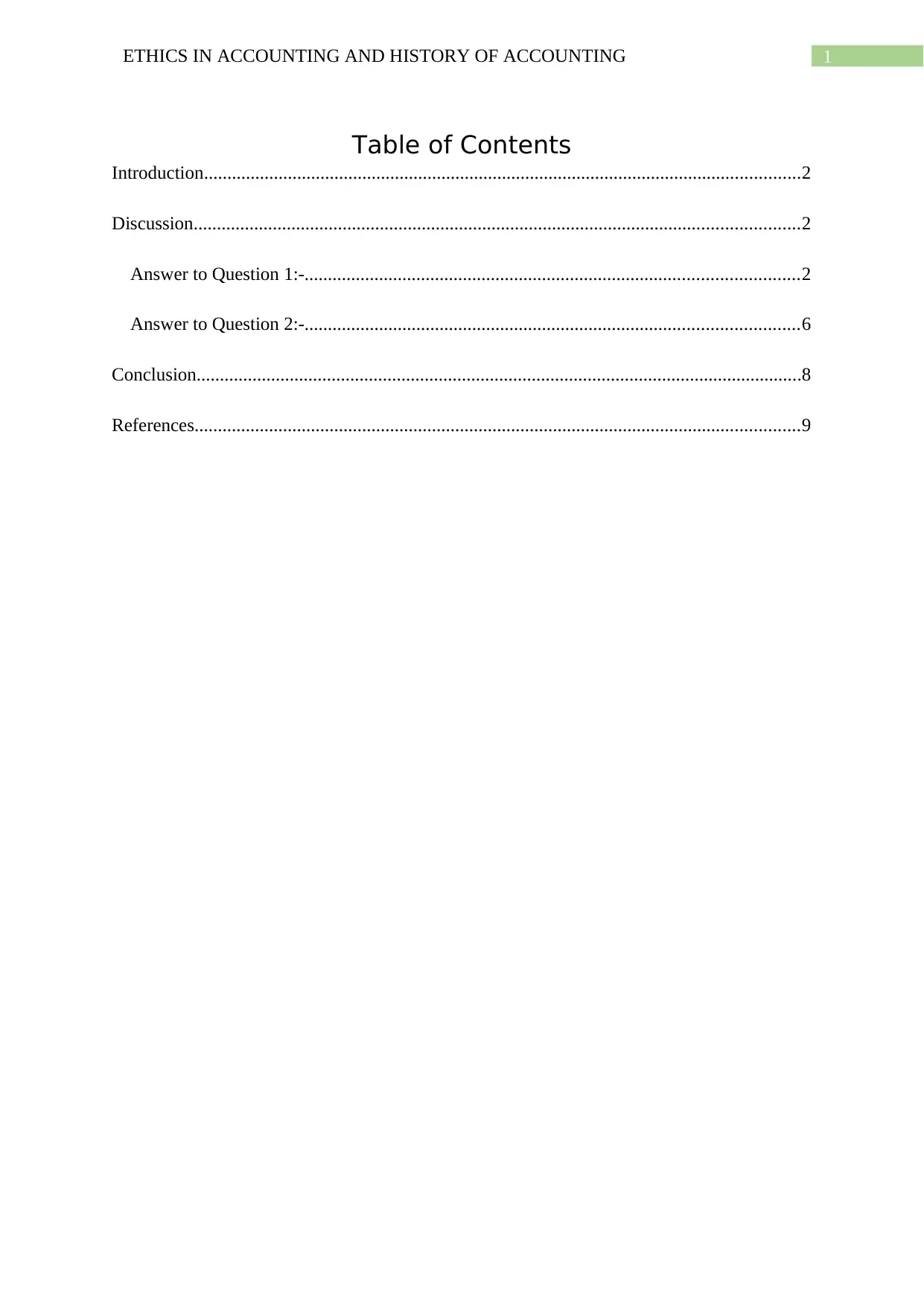
1ETHICS IN ACCOUNTING AND HISTORY OF ACCOUNTING
Table of Contents
Introduction................................................................................................................................2
Discussion..................................................................................................................................2
Answer to Question 1:-..........................................................................................................2
Answer to Question 2:-..........................................................................................................6
Conclusion..................................................................................................................................8
References..................................................................................................................................9
Table of Contents
Introduction................................................................................................................................2
Discussion..................................................................................................................................2
Answer to Question 1:-..........................................................................................................2
Answer to Question 2:-..........................................................................................................6
Conclusion..................................................................................................................................8
References..................................................................................................................................9
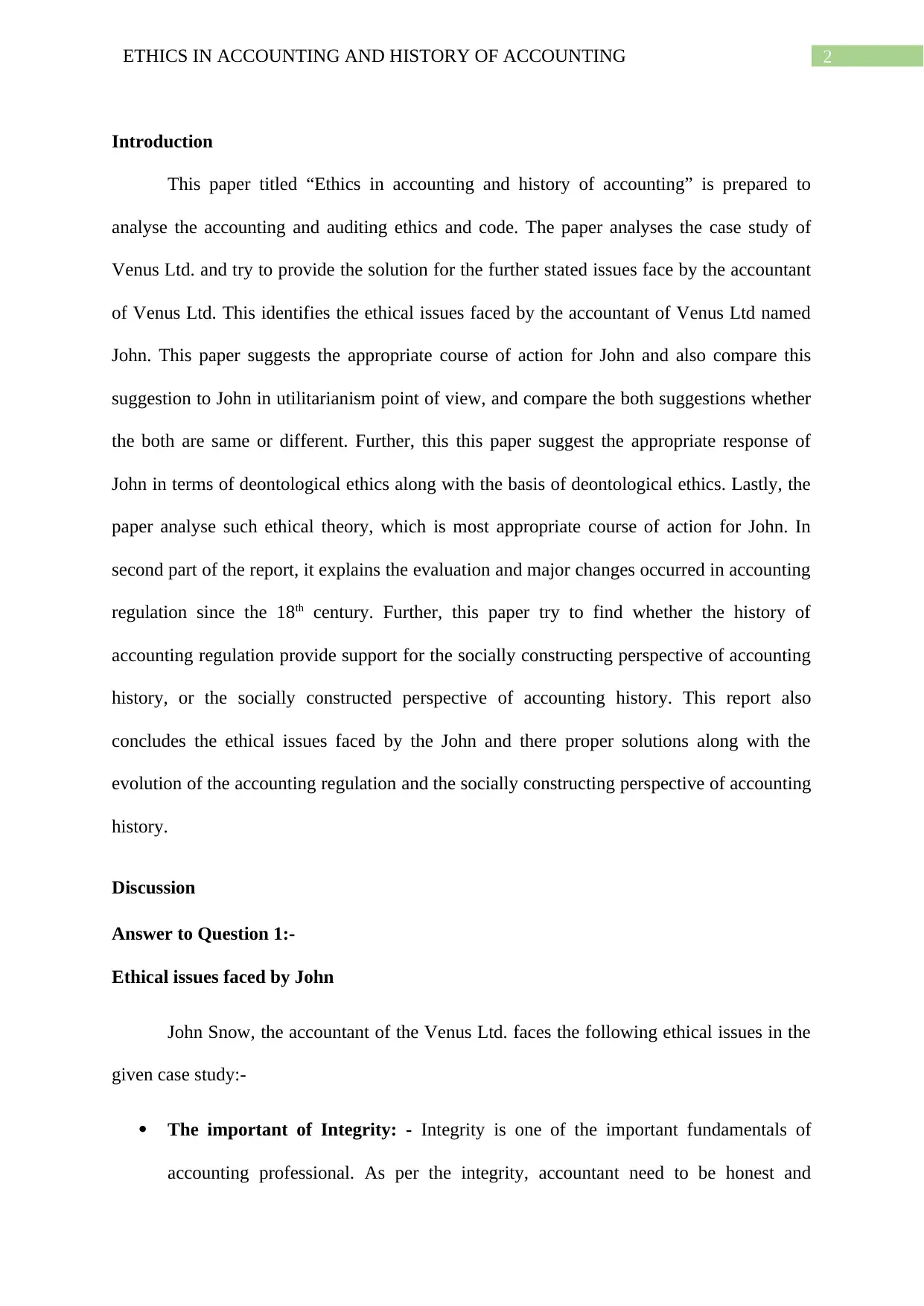
2ETHICS IN ACCOUNTING AND HISTORY OF ACCOUNTING
Introduction
This paper titled “Ethics in accounting and history of accounting” is prepared to
analyse the accounting and auditing ethics and code. The paper analyses the case study of
Venus Ltd. and try to provide the solution for the further stated issues face by the accountant
of Venus Ltd. This identifies the ethical issues faced by the accountant of Venus Ltd named
John. This paper suggests the appropriate course of action for John and also compare this
suggestion to John in utilitarianism point of view, and compare the both suggestions whether
the both are same or different. Further, this this paper suggest the appropriate response of
John in terms of deontological ethics along with the basis of deontological ethics. Lastly, the
paper analyse such ethical theory, which is most appropriate course of action for John. In
second part of the report, it explains the evaluation and major changes occurred in accounting
regulation since the 18th century. Further, this paper try to find whether the history of
accounting regulation provide support for the socially constructing perspective of accounting
history, or the socially constructed perspective of accounting history. This report also
concludes the ethical issues faced by the John and there proper solutions along with the
evolution of the accounting regulation and the socially constructing perspective of accounting
history.
Discussion
Answer to Question 1:-
Ethical issues faced by John
John Snow, the accountant of the Venus Ltd. faces the following ethical issues in the
given case study:-
The important of Integrity: - Integrity is one of the important fundamentals of
accounting professional. As per the integrity, accountant need to be honest and
Introduction
This paper titled “Ethics in accounting and history of accounting” is prepared to
analyse the accounting and auditing ethics and code. The paper analyses the case study of
Venus Ltd. and try to provide the solution for the further stated issues face by the accountant
of Venus Ltd. This identifies the ethical issues faced by the accountant of Venus Ltd named
John. This paper suggests the appropriate course of action for John and also compare this
suggestion to John in utilitarianism point of view, and compare the both suggestions whether
the both are same or different. Further, this this paper suggest the appropriate response of
John in terms of deontological ethics along with the basis of deontological ethics. Lastly, the
paper analyse such ethical theory, which is most appropriate course of action for John. In
second part of the report, it explains the evaluation and major changes occurred in accounting
regulation since the 18th century. Further, this paper try to find whether the history of
accounting regulation provide support for the socially constructing perspective of accounting
history, or the socially constructed perspective of accounting history. This report also
concludes the ethical issues faced by the John and there proper solutions along with the
evolution of the accounting regulation and the socially constructing perspective of accounting
history.
Discussion
Answer to Question 1:-
Ethical issues faced by John
John Snow, the accountant of the Venus Ltd. faces the following ethical issues in the
given case study:-
The important of Integrity: - Integrity is one of the important fundamentals of
accounting professional. As per the integrity, accountant need to be honest and
⊘ This is a preview!⊘
Do you want full access?
Subscribe today to unlock all pages.

Trusted by 1+ million students worldwide
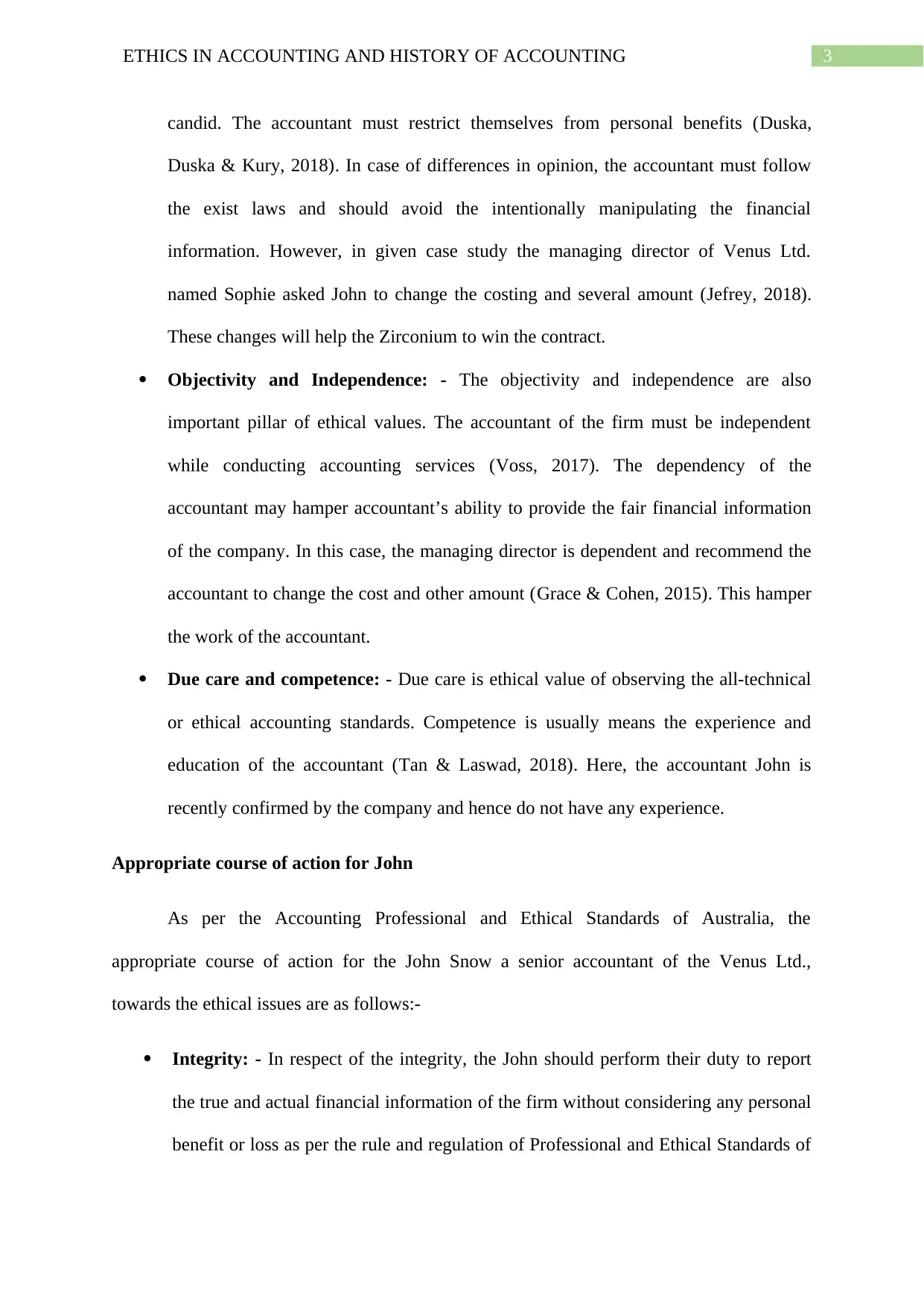
3ETHICS IN ACCOUNTING AND HISTORY OF ACCOUNTING
candid. The accountant must restrict themselves from personal benefits (Duska,
Duska & Kury, 2018). In case of differences in opinion, the accountant must follow
the exist laws and should avoid the intentionally manipulating the financial
information. However, in given case study the managing director of Venus Ltd.
named Sophie asked John to change the costing and several amount (Jefrey, 2018).
These changes will help the Zirconium to win the contract.
Objectivity and Independence: - The objectivity and independence are also
important pillar of ethical values. The accountant of the firm must be independent
while conducting accounting services (Voss, 2017). The dependency of the
accountant may hamper accountant’s ability to provide the fair financial information
of the company. In this case, the managing director is dependent and recommend the
accountant to change the cost and other amount (Grace & Cohen, 2015). This hamper
the work of the accountant.
Due care and competence: - Due care is ethical value of observing the all-technical
or ethical accounting standards. Competence is usually means the experience and
education of the accountant (Tan & Laswad, 2018). Here, the accountant John is
recently confirmed by the company and hence do not have any experience.
Appropriate course of action for John
As per the Accounting Professional and Ethical Standards of Australia, the
appropriate course of action for the John Snow a senior accountant of the Venus Ltd.,
towards the ethical issues are as follows:-
Integrity: - In respect of the integrity, the John should perform their duty to report
the true and actual financial information of the firm without considering any personal
benefit or loss as per the rule and regulation of Professional and Ethical Standards of
candid. The accountant must restrict themselves from personal benefits (Duska,
Duska & Kury, 2018). In case of differences in opinion, the accountant must follow
the exist laws and should avoid the intentionally manipulating the financial
information. However, in given case study the managing director of Venus Ltd.
named Sophie asked John to change the costing and several amount (Jefrey, 2018).
These changes will help the Zirconium to win the contract.
Objectivity and Independence: - The objectivity and independence are also
important pillar of ethical values. The accountant of the firm must be independent
while conducting accounting services (Voss, 2017). The dependency of the
accountant may hamper accountant’s ability to provide the fair financial information
of the company. In this case, the managing director is dependent and recommend the
accountant to change the cost and other amount (Grace & Cohen, 2015). This hamper
the work of the accountant.
Due care and competence: - Due care is ethical value of observing the all-technical
or ethical accounting standards. Competence is usually means the experience and
education of the accountant (Tan & Laswad, 2018). Here, the accountant John is
recently confirmed by the company and hence do not have any experience.
Appropriate course of action for John
As per the Accounting Professional and Ethical Standards of Australia, the
appropriate course of action for the John Snow a senior accountant of the Venus Ltd.,
towards the ethical issues are as follows:-
Integrity: - In respect of the integrity, the John should perform their duty to report
the true and actual financial information of the firm without considering any personal
benefit or loss as per the rule and regulation of Professional and Ethical Standards of
Paraphrase This Document
Need a fresh take? Get an instant paraphrase of this document with our AI Paraphraser
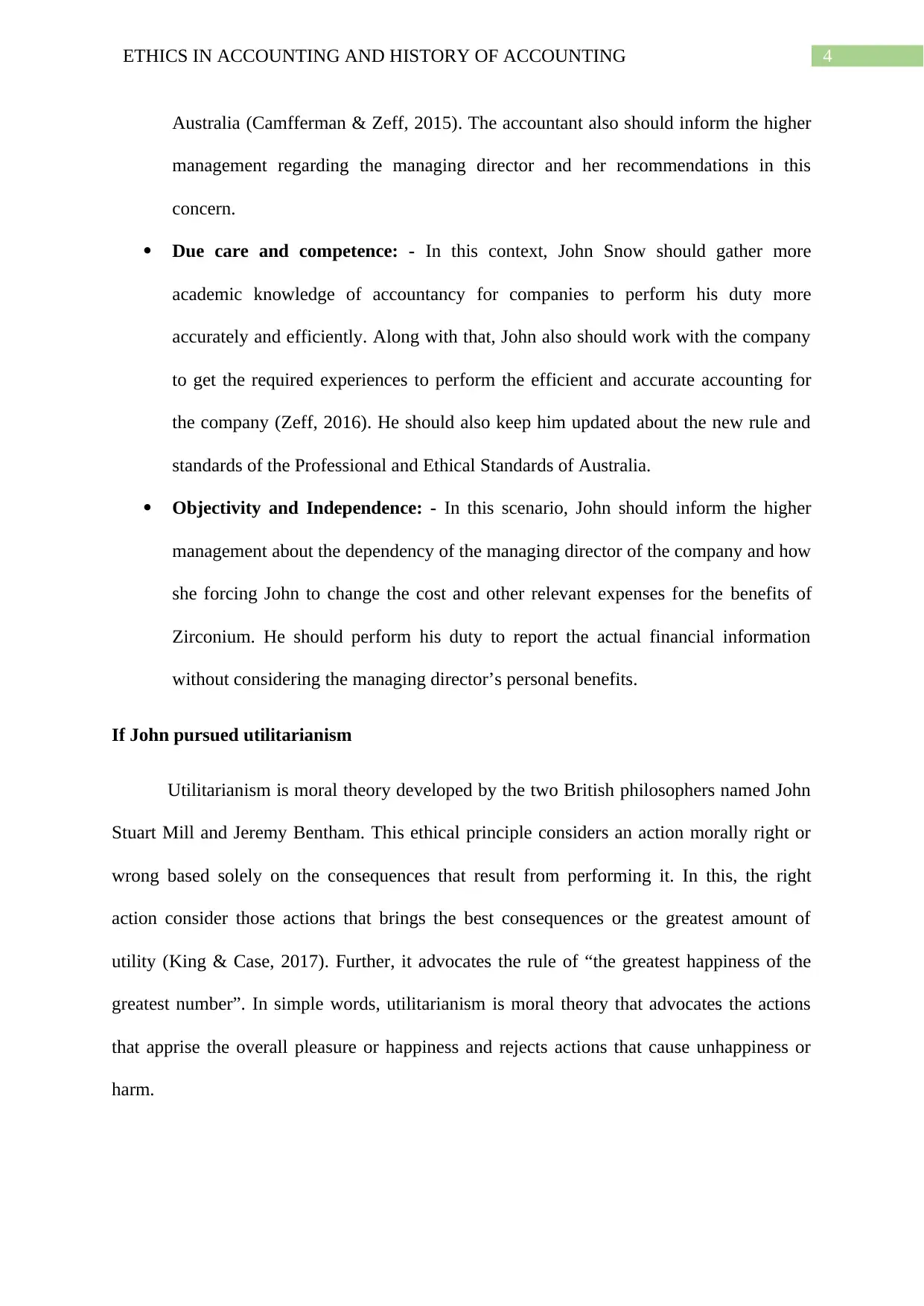
4ETHICS IN ACCOUNTING AND HISTORY OF ACCOUNTING
Australia (Camfferman & Zeff, 2015). The accountant also should inform the higher
management regarding the managing director and her recommendations in this
concern.
Due care and competence: - In this context, John Snow should gather more
academic knowledge of accountancy for companies to perform his duty more
accurately and efficiently. Along with that, John also should work with the company
to get the required experiences to perform the efficient and accurate accounting for
the company (Zeff, 2016). He should also keep him updated about the new rule and
standards of the Professional and Ethical Standards of Australia.
Objectivity and Independence: - In this scenario, John should inform the higher
management about the dependency of the managing director of the company and how
she forcing John to change the cost and other relevant expenses for the benefits of
Zirconium. He should perform his duty to report the actual financial information
without considering the managing director’s personal benefits.
If John pursued utilitarianism
Utilitarianism is moral theory developed by the two British philosophers named John
Stuart Mill and Jeremy Bentham. This ethical principle considers an action morally right or
wrong based solely on the consequences that result from performing it. In this, the right
action consider those actions that brings the best consequences or the greatest amount of
utility (King & Case, 2017). Further, it advocates the rule of “the greatest happiness of the
greatest number”. In simple words, utilitarianism is moral theory that advocates the actions
that apprise the overall pleasure or happiness and rejects actions that cause unhappiness or
harm.
Australia (Camfferman & Zeff, 2015). The accountant also should inform the higher
management regarding the managing director and her recommendations in this
concern.
Due care and competence: - In this context, John Snow should gather more
academic knowledge of accountancy for companies to perform his duty more
accurately and efficiently. Along with that, John also should work with the company
to get the required experiences to perform the efficient and accurate accounting for
the company (Zeff, 2016). He should also keep him updated about the new rule and
standards of the Professional and Ethical Standards of Australia.
Objectivity and Independence: - In this scenario, John should inform the higher
management about the dependency of the managing director of the company and how
she forcing John to change the cost and other relevant expenses for the benefits of
Zirconium. He should perform his duty to report the actual financial information
without considering the managing director’s personal benefits.
If John pursued utilitarianism
Utilitarianism is moral theory developed by the two British philosophers named John
Stuart Mill and Jeremy Bentham. This ethical principle considers an action morally right or
wrong based solely on the consequences that result from performing it. In this, the right
action consider those actions that brings the best consequences or the greatest amount of
utility (King & Case, 2017). Further, it advocates the rule of “the greatest happiness of the
greatest number”. In simple words, utilitarianism is moral theory that advocates the actions
that apprise the overall pleasure or happiness and rejects actions that cause unhappiness or
harm.
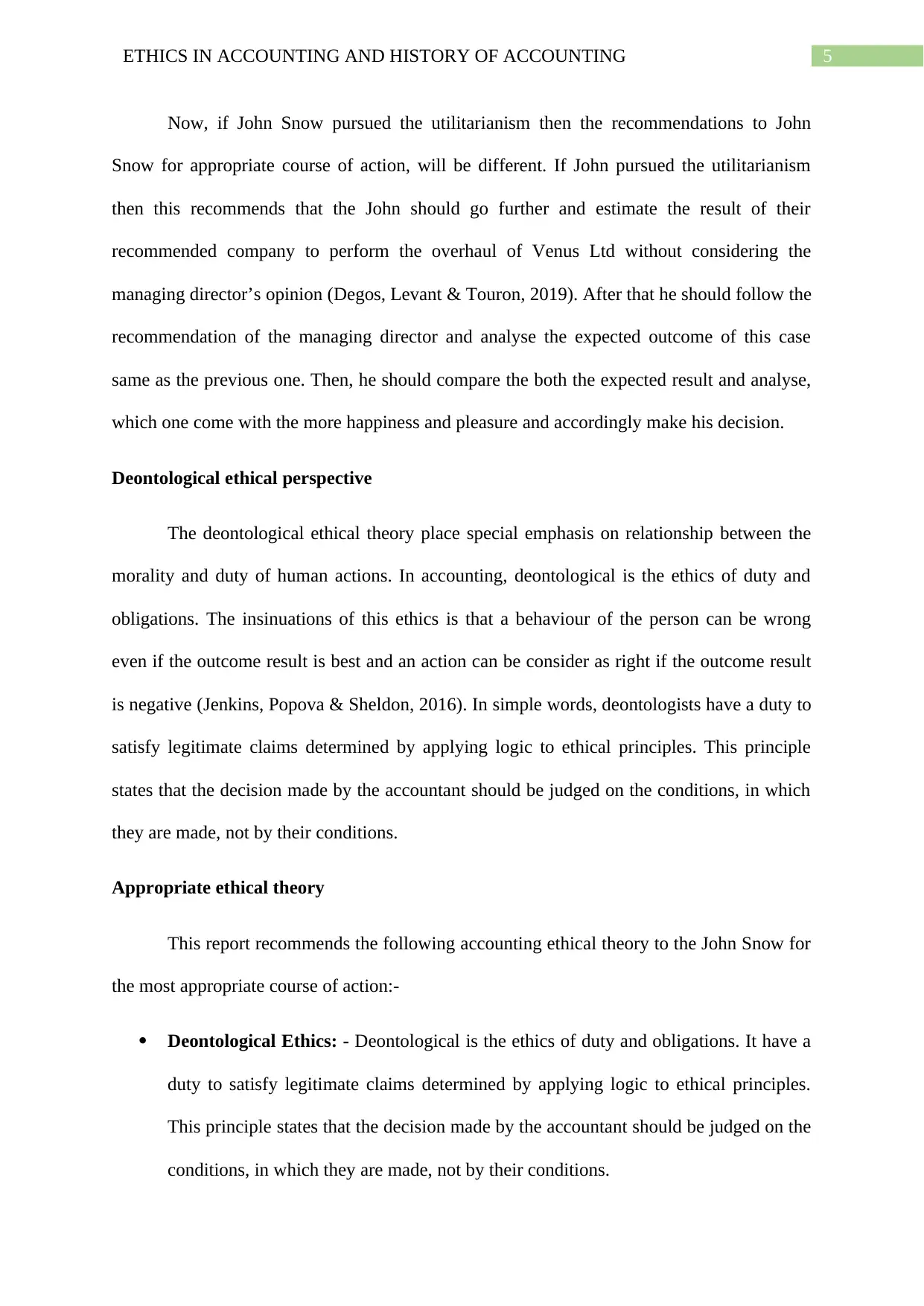
5ETHICS IN ACCOUNTING AND HISTORY OF ACCOUNTING
Now, if John Snow pursued the utilitarianism then the recommendations to John
Snow for appropriate course of action, will be different. If John pursued the utilitarianism
then this recommends that the John should go further and estimate the result of their
recommended company to perform the overhaul of Venus Ltd without considering the
managing director’s opinion (Degos, Levant & Touron, 2019). After that he should follow the
recommendation of the managing director and analyse the expected outcome of this case
same as the previous one. Then, he should compare the both the expected result and analyse,
which one come with the more happiness and pleasure and accordingly make his decision.
Deontological ethical perspective
The deontological ethical theory place special emphasis on relationship between the
morality and duty of human actions. In accounting, deontological is the ethics of duty and
obligations. The insinuations of this ethics is that a behaviour of the person can be wrong
even if the outcome result is best and an action can be consider as right if the outcome result
is negative (Jenkins, Popova & Sheldon, 2016). In simple words, deontologists have a duty to
satisfy legitimate claims determined by applying logic to ethical principles. This principle
states that the decision made by the accountant should be judged on the conditions, in which
they are made, not by their conditions.
Appropriate ethical theory
This report recommends the following accounting ethical theory to the John Snow for
the most appropriate course of action:-
Deontological Ethics: - Deontological is the ethics of duty and obligations. It have a
duty to satisfy legitimate claims determined by applying logic to ethical principles.
This principle states that the decision made by the accountant should be judged on the
conditions, in which they are made, not by their conditions.
Now, if John Snow pursued the utilitarianism then the recommendations to John
Snow for appropriate course of action, will be different. If John pursued the utilitarianism
then this recommends that the John should go further and estimate the result of their
recommended company to perform the overhaul of Venus Ltd without considering the
managing director’s opinion (Degos, Levant & Touron, 2019). After that he should follow the
recommendation of the managing director and analyse the expected outcome of this case
same as the previous one. Then, he should compare the both the expected result and analyse,
which one come with the more happiness and pleasure and accordingly make his decision.
Deontological ethical perspective
The deontological ethical theory place special emphasis on relationship between the
morality and duty of human actions. In accounting, deontological is the ethics of duty and
obligations. The insinuations of this ethics is that a behaviour of the person can be wrong
even if the outcome result is best and an action can be consider as right if the outcome result
is negative (Jenkins, Popova & Sheldon, 2016). In simple words, deontologists have a duty to
satisfy legitimate claims determined by applying logic to ethical principles. This principle
states that the decision made by the accountant should be judged on the conditions, in which
they are made, not by their conditions.
Appropriate ethical theory
This report recommends the following accounting ethical theory to the John Snow for
the most appropriate course of action:-
Deontological Ethics: - Deontological is the ethics of duty and obligations. It have a
duty to satisfy legitimate claims determined by applying logic to ethical principles.
This principle states that the decision made by the accountant should be judged on the
conditions, in which they are made, not by their conditions.
⊘ This is a preview!⊘
Do you want full access?
Subscribe today to unlock all pages.

Trusted by 1+ million students worldwide
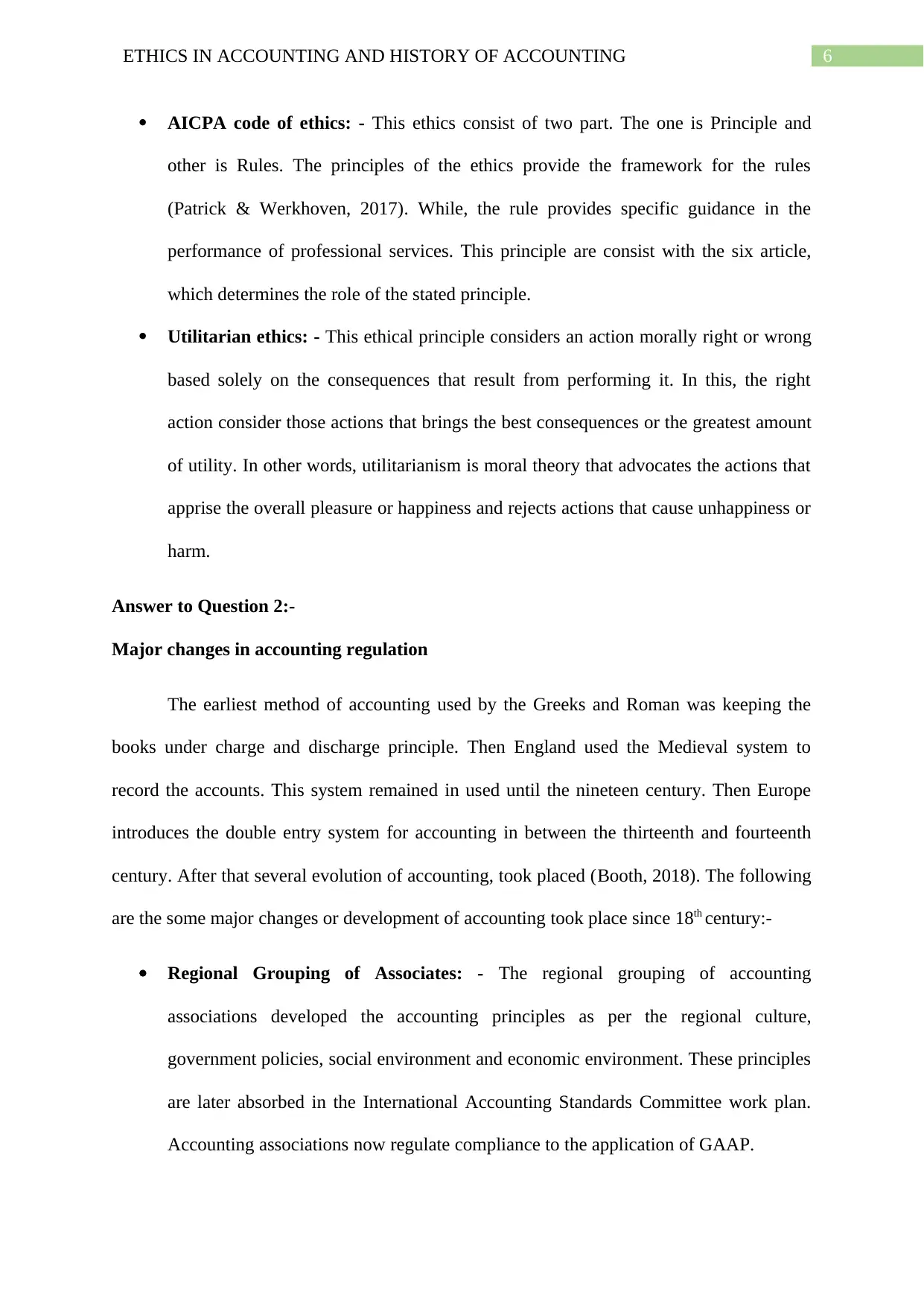
6ETHICS IN ACCOUNTING AND HISTORY OF ACCOUNTING
AICPA code of ethics: - This ethics consist of two part. The one is Principle and
other is Rules. The principles of the ethics provide the framework for the rules
(Patrick & Werkhoven, 2017). While, the rule provides specific guidance in the
performance of professional services. This principle are consist with the six article,
which determines the role of the stated principle.
Utilitarian ethics: - This ethical principle considers an action morally right or wrong
based solely on the consequences that result from performing it. In this, the right
action consider those actions that brings the best consequences or the greatest amount
of utility. In other words, utilitarianism is moral theory that advocates the actions that
apprise the overall pleasure or happiness and rejects actions that cause unhappiness or
harm.
Answer to Question 2:-
Major changes in accounting regulation
The earliest method of accounting used by the Greeks and Roman was keeping the
books under charge and discharge principle. Then England used the Medieval system to
record the accounts. This system remained in used until the nineteen century. Then Europe
introduces the double entry system for accounting in between the thirteenth and fourteenth
century. After that several evolution of accounting, took placed (Booth, 2018). The following
are the some major changes or development of accounting took place since 18th century:-
Regional Grouping of Associates: - The regional grouping of accounting
associations developed the accounting principles as per the regional culture,
government policies, social environment and economic environment. These principles
are later absorbed in the International Accounting Standards Committee work plan.
Accounting associations now regulate compliance to the application of GAAP.
AICPA code of ethics: - This ethics consist of two part. The one is Principle and
other is Rules. The principles of the ethics provide the framework for the rules
(Patrick & Werkhoven, 2017). While, the rule provides specific guidance in the
performance of professional services. This principle are consist with the six article,
which determines the role of the stated principle.
Utilitarian ethics: - This ethical principle considers an action morally right or wrong
based solely on the consequences that result from performing it. In this, the right
action consider those actions that brings the best consequences or the greatest amount
of utility. In other words, utilitarianism is moral theory that advocates the actions that
apprise the overall pleasure or happiness and rejects actions that cause unhappiness or
harm.
Answer to Question 2:-
Major changes in accounting regulation
The earliest method of accounting used by the Greeks and Roman was keeping the
books under charge and discharge principle. Then England used the Medieval system to
record the accounts. This system remained in used until the nineteen century. Then Europe
introduces the double entry system for accounting in between the thirteenth and fourteenth
century. After that several evolution of accounting, took placed (Booth, 2018). The following
are the some major changes or development of accounting took place since 18th century:-
Regional Grouping of Associates: - The regional grouping of accounting
associations developed the accounting principles as per the regional culture,
government policies, social environment and economic environment. These principles
are later absorbed in the International Accounting Standards Committee work plan.
Accounting associations now regulate compliance to the application of GAAP.
Paraphrase This Document
Need a fresh take? Get an instant paraphrase of this document with our AI Paraphraser
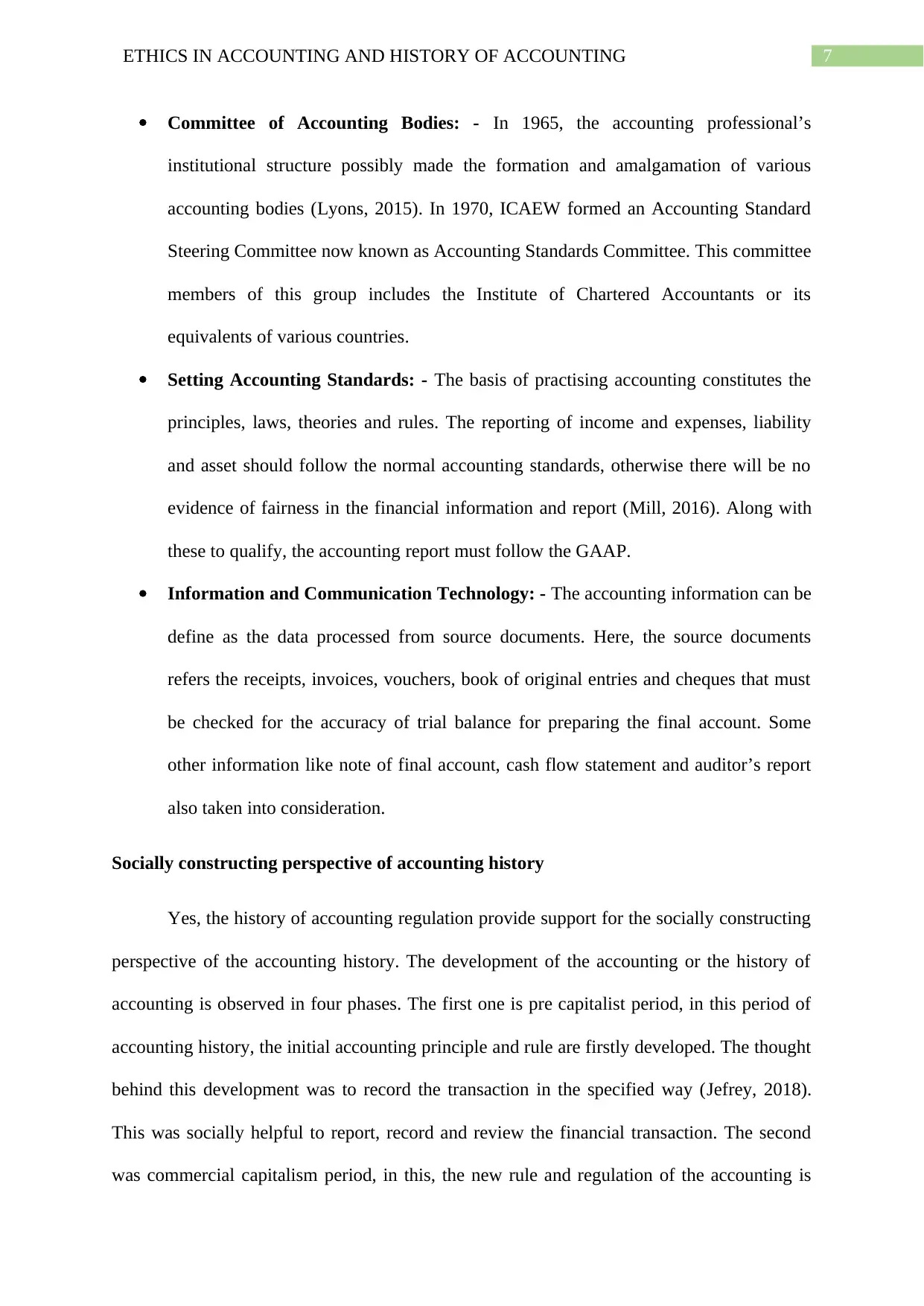
7ETHICS IN ACCOUNTING AND HISTORY OF ACCOUNTING
Committee of Accounting Bodies: - In 1965, the accounting professional’s
institutional structure possibly made the formation and amalgamation of various
accounting bodies (Lyons, 2015). In 1970, ICAEW formed an Accounting Standard
Steering Committee now known as Accounting Standards Committee. This committee
members of this group includes the Institute of Chartered Accountants or its
equivalents of various countries.
Setting Accounting Standards: - The basis of practising accounting constitutes the
principles, laws, theories and rules. The reporting of income and expenses, liability
and asset should follow the normal accounting standards, otherwise there will be no
evidence of fairness in the financial information and report (Mill, 2016). Along with
these to qualify, the accounting report must follow the GAAP.
Information and Communication Technology: - The accounting information can be
define as the data processed from source documents. Here, the source documents
refers the receipts, invoices, vouchers, book of original entries and cheques that must
be checked for the accuracy of trial balance for preparing the final account. Some
other information like note of final account, cash flow statement and auditor’s report
also taken into consideration.
Socially constructing perspective of accounting history
Yes, the history of accounting regulation provide support for the socially constructing
perspective of the accounting history. The development of the accounting or the history of
accounting is observed in four phases. The first one is pre capitalist period, in this period of
accounting history, the initial accounting principle and rule are firstly developed. The thought
behind this development was to record the transaction in the specified way (Jefrey, 2018).
This was socially helpful to report, record and review the financial transaction. The second
was commercial capitalism period, in this, the new rule and regulation of the accounting is
Committee of Accounting Bodies: - In 1965, the accounting professional’s
institutional structure possibly made the formation and amalgamation of various
accounting bodies (Lyons, 2015). In 1970, ICAEW formed an Accounting Standard
Steering Committee now known as Accounting Standards Committee. This committee
members of this group includes the Institute of Chartered Accountants or its
equivalents of various countries.
Setting Accounting Standards: - The basis of practising accounting constitutes the
principles, laws, theories and rules. The reporting of income and expenses, liability
and asset should follow the normal accounting standards, otherwise there will be no
evidence of fairness in the financial information and report (Mill, 2016). Along with
these to qualify, the accounting report must follow the GAAP.
Information and Communication Technology: - The accounting information can be
define as the data processed from source documents. Here, the source documents
refers the receipts, invoices, vouchers, book of original entries and cheques that must
be checked for the accuracy of trial balance for preparing the final account. Some
other information like note of final account, cash flow statement and auditor’s report
also taken into consideration.
Socially constructing perspective of accounting history
Yes, the history of accounting regulation provide support for the socially constructing
perspective of the accounting history. The development of the accounting or the history of
accounting is observed in four phases. The first one is pre capitalist period, in this period of
accounting history, the initial accounting principle and rule are firstly developed. The thought
behind this development was to record the transaction in the specified way (Jefrey, 2018).
This was socially helpful to report, record and review the financial transaction. The second
was commercial capitalism period, in this, the new rule and regulation of the accounting is
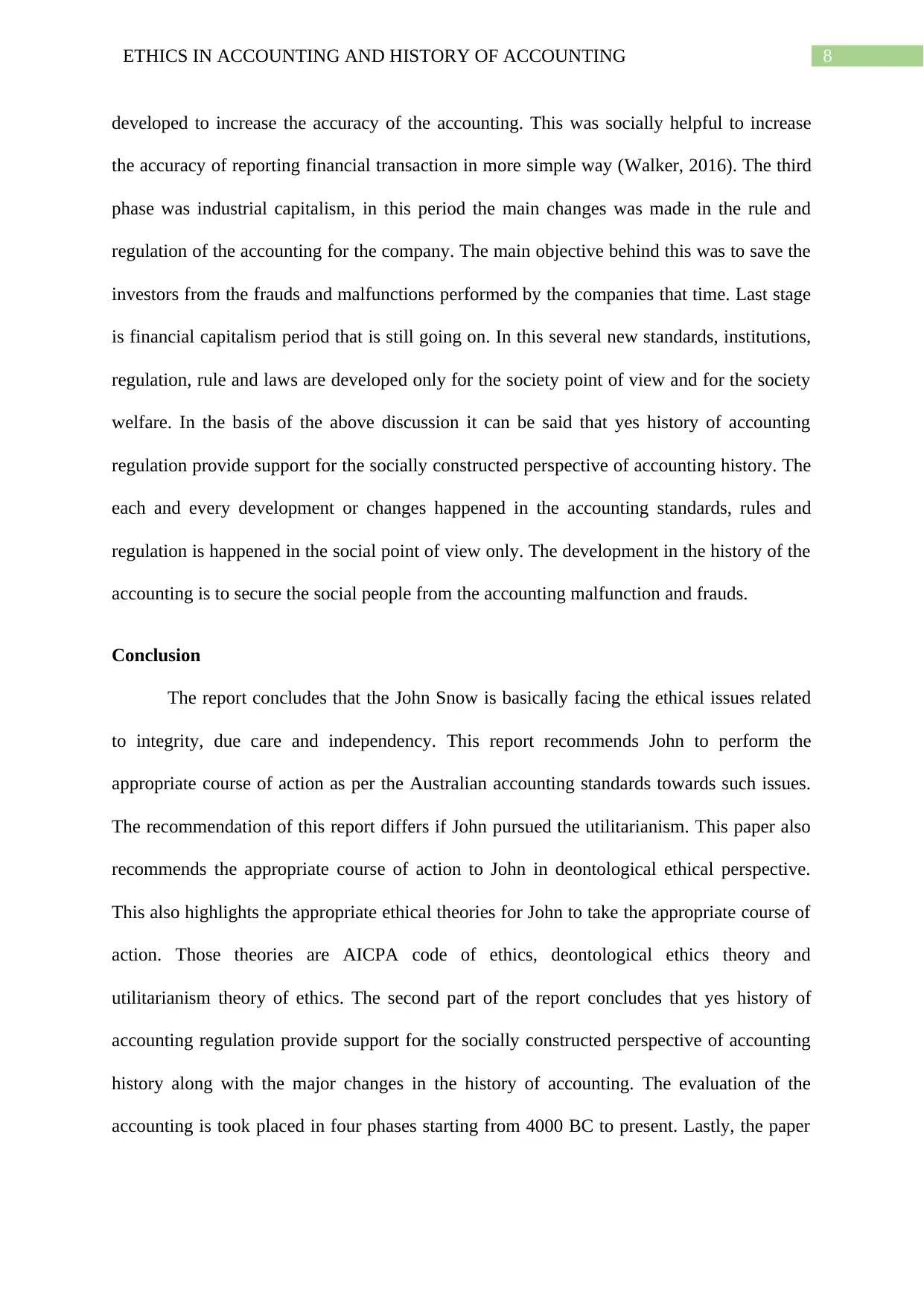
8ETHICS IN ACCOUNTING AND HISTORY OF ACCOUNTING
developed to increase the accuracy of the accounting. This was socially helpful to increase
the accuracy of reporting financial transaction in more simple way (Walker, 2016). The third
phase was industrial capitalism, in this period the main changes was made in the rule and
regulation of the accounting for the company. The main objective behind this was to save the
investors from the frauds and malfunctions performed by the companies that time. Last stage
is financial capitalism period that is still going on. In this several new standards, institutions,
regulation, rule and laws are developed only for the society point of view and for the society
welfare. In the basis of the above discussion it can be said that yes history of accounting
regulation provide support for the socially constructed perspective of accounting history. The
each and every development or changes happened in the accounting standards, rules and
regulation is happened in the social point of view only. The development in the history of the
accounting is to secure the social people from the accounting malfunction and frauds.
Conclusion
The report concludes that the John Snow is basically facing the ethical issues related
to integrity, due care and independency. This report recommends John to perform the
appropriate course of action as per the Australian accounting standards towards such issues.
The recommendation of this report differs if John pursued the utilitarianism. This paper also
recommends the appropriate course of action to John in deontological ethical perspective.
This also highlights the appropriate ethical theories for John to take the appropriate course of
action. Those theories are AICPA code of ethics, deontological ethics theory and
utilitarianism theory of ethics. The second part of the report concludes that yes history of
accounting regulation provide support for the socially constructed perspective of accounting
history along with the major changes in the history of accounting. The evaluation of the
accounting is took placed in four phases starting from 4000 BC to present. Lastly, the paper
developed to increase the accuracy of the accounting. This was socially helpful to increase
the accuracy of reporting financial transaction in more simple way (Walker, 2016). The third
phase was industrial capitalism, in this period the main changes was made in the rule and
regulation of the accounting for the company. The main objective behind this was to save the
investors from the frauds and malfunctions performed by the companies that time. Last stage
is financial capitalism period that is still going on. In this several new standards, institutions,
regulation, rule and laws are developed only for the society point of view and for the society
welfare. In the basis of the above discussion it can be said that yes history of accounting
regulation provide support for the socially constructed perspective of accounting history. The
each and every development or changes happened in the accounting standards, rules and
regulation is happened in the social point of view only. The development in the history of the
accounting is to secure the social people from the accounting malfunction and frauds.
Conclusion
The report concludes that the John Snow is basically facing the ethical issues related
to integrity, due care and independency. This report recommends John to perform the
appropriate course of action as per the Australian accounting standards towards such issues.
The recommendation of this report differs if John pursued the utilitarianism. This paper also
recommends the appropriate course of action to John in deontological ethical perspective.
This also highlights the appropriate ethical theories for John to take the appropriate course of
action. Those theories are AICPA code of ethics, deontological ethics theory and
utilitarianism theory of ethics. The second part of the report concludes that yes history of
accounting regulation provide support for the socially constructed perspective of accounting
history along with the major changes in the history of accounting. The evaluation of the
accounting is took placed in four phases starting from 4000 BC to present. Lastly, the paper
⊘ This is a preview!⊘
Do you want full access?
Subscribe today to unlock all pages.

Trusted by 1+ million students worldwide
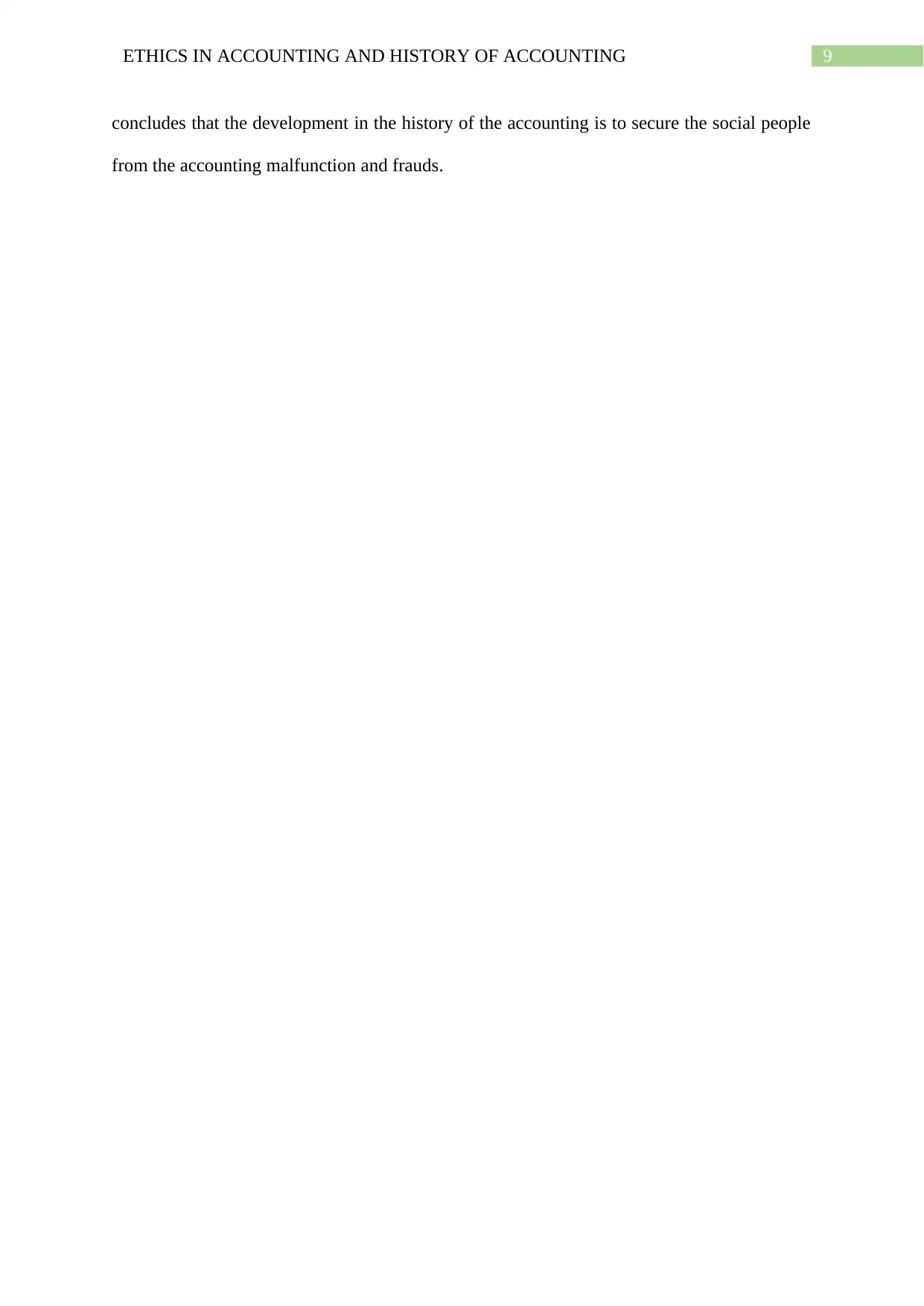
9ETHICS IN ACCOUNTING AND HISTORY OF ACCOUNTING
concludes that the development in the history of the accounting is to secure the social people
from the accounting malfunction and frauds.
concludes that the development in the history of the accounting is to secure the social people
from the accounting malfunction and frauds.
Paraphrase This Document
Need a fresh take? Get an instant paraphrase of this document with our AI Paraphraser
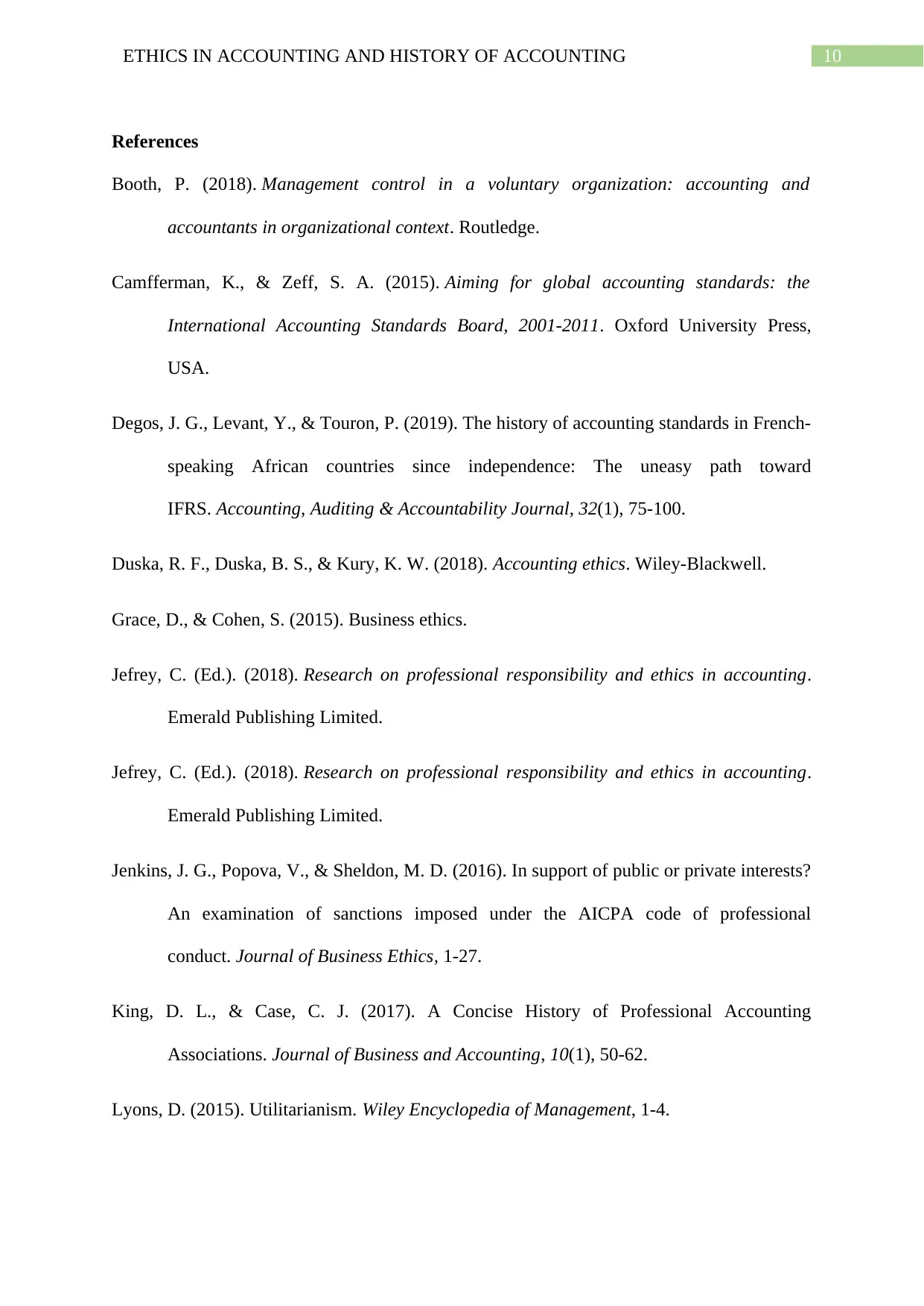
10ETHICS IN ACCOUNTING AND HISTORY OF ACCOUNTING
References
Booth, P. (2018). Management control in a voluntary organization: accounting and
accountants in organizational context. Routledge.
Camfferman, K., & Zeff, S. A. (2015). Aiming for global accounting standards: the
International Accounting Standards Board, 2001-2011. Oxford University Press,
USA.
Degos, J. G., Levant, Y., & Touron, P. (2019). The history of accounting standards in French-
speaking African countries since independence: The uneasy path toward
IFRS. Accounting, Auditing & Accountability Journal, 32(1), 75-100.
Duska, R. F., Duska, B. S., & Kury, K. W. (2018). Accounting ethics. Wiley-Blackwell.
Grace, D., & Cohen, S. (2015). Business ethics.
Jefrey, C. (Ed.). (2018). Research on professional responsibility and ethics in accounting.
Emerald Publishing Limited.
Jefrey, C. (Ed.). (2018). Research on professional responsibility and ethics in accounting.
Emerald Publishing Limited.
Jenkins, J. G., Popova, V., & Sheldon, M. D. (2016). In support of public or private interests?
An examination of sanctions imposed under the AICPA code of professional
conduct. Journal of Business Ethics, 1-27.
King, D. L., & Case, C. J. (2017). A Concise History of Professional Accounting
Associations. Journal of Business and Accounting, 10(1), 50-62.
Lyons, D. (2015). Utilitarianism. Wiley Encyclopedia of Management, 1-4.
References
Booth, P. (2018). Management control in a voluntary organization: accounting and
accountants in organizational context. Routledge.
Camfferman, K., & Zeff, S. A. (2015). Aiming for global accounting standards: the
International Accounting Standards Board, 2001-2011. Oxford University Press,
USA.
Degos, J. G., Levant, Y., & Touron, P. (2019). The history of accounting standards in French-
speaking African countries since independence: The uneasy path toward
IFRS. Accounting, Auditing & Accountability Journal, 32(1), 75-100.
Duska, R. F., Duska, B. S., & Kury, K. W. (2018). Accounting ethics. Wiley-Blackwell.
Grace, D., & Cohen, S. (2015). Business ethics.
Jefrey, C. (Ed.). (2018). Research on professional responsibility and ethics in accounting.
Emerald Publishing Limited.
Jefrey, C. (Ed.). (2018). Research on professional responsibility and ethics in accounting.
Emerald Publishing Limited.
Jenkins, J. G., Popova, V., & Sheldon, M. D. (2016). In support of public or private interests?
An examination of sanctions imposed under the AICPA code of professional
conduct. Journal of Business Ethics, 1-27.
King, D. L., & Case, C. J. (2017). A Concise History of Professional Accounting
Associations. Journal of Business and Accounting, 10(1), 50-62.
Lyons, D. (2015). Utilitarianism. Wiley Encyclopedia of Management, 1-4.
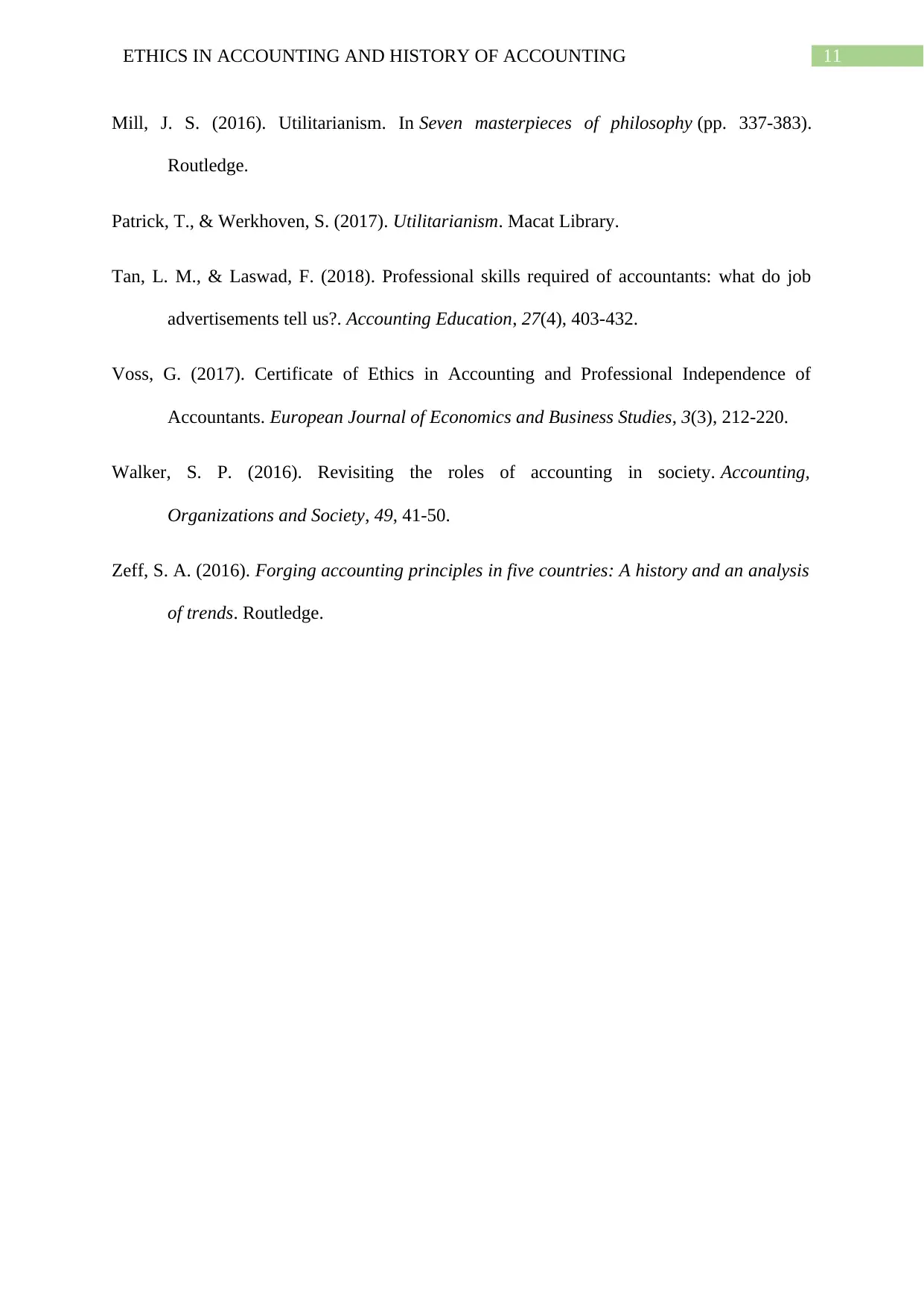
11ETHICS IN ACCOUNTING AND HISTORY OF ACCOUNTING
Mill, J. S. (2016). Utilitarianism. In Seven masterpieces of philosophy (pp. 337-383).
Routledge.
Patrick, T., & Werkhoven, S. (2017). Utilitarianism. Macat Library.
Tan, L. M., & Laswad, F. (2018). Professional skills required of accountants: what do job
advertisements tell us?. Accounting Education, 27(4), 403-432.
Voss, G. (2017). Certificate of Ethics in Accounting and Professional Independence of
Accountants. European Journal of Economics and Business Studies, 3(3), 212-220.
Walker, S. P. (2016). Revisiting the roles of accounting in society. Accounting,
Organizations and Society, 49, 41-50.
Zeff, S. A. (2016). Forging accounting principles in five countries: A history and an analysis
of trends. Routledge.
Mill, J. S. (2016). Utilitarianism. In Seven masterpieces of philosophy (pp. 337-383).
Routledge.
Patrick, T., & Werkhoven, S. (2017). Utilitarianism. Macat Library.
Tan, L. M., & Laswad, F. (2018). Professional skills required of accountants: what do job
advertisements tell us?. Accounting Education, 27(4), 403-432.
Voss, G. (2017). Certificate of Ethics in Accounting and Professional Independence of
Accountants. European Journal of Economics and Business Studies, 3(3), 212-220.
Walker, S. P. (2016). Revisiting the roles of accounting in society. Accounting,
Organizations and Society, 49, 41-50.
Zeff, S. A. (2016). Forging accounting principles in five countries: A history and an analysis
of trends. Routledge.
⊘ This is a preview!⊘
Do you want full access?
Subscribe today to unlock all pages.

Trusted by 1+ million students worldwide
1 out of 12
Related Documents
Your All-in-One AI-Powered Toolkit for Academic Success.
+13062052269
info@desklib.com
Available 24*7 on WhatsApp / Email
![[object Object]](/_next/static/media/star-bottom.7253800d.svg)
Unlock your academic potential
Copyright © 2020–2026 A2Z Services. All Rights Reserved. Developed and managed by ZUCOL.



